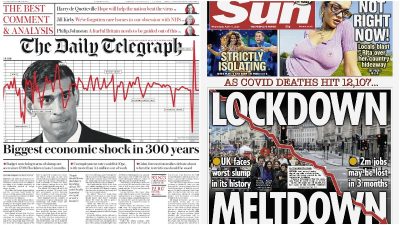To Lockdown or Not to Lockdown: Britain Debates

The UK government is facing increased pressure to call for a national lockdown or ‘circuit breaker’ as it has commonly become known after a further 310 deaths to Covid-19 were announced on Thursday. It brings the total number of deaths to the virus in Britain to 45,955 to date with almost 25,000 new cases per day. UK scientists are concerned at the rate at which the ‘R’ number is rising, particularly in London where it has reached almost 3 (being the number of people infected by one person already carrying coronavirus). Given the fact that any R number over 1 is considered a sign the virus is out of control, these statistics are extremely worrying.
London may now boast the highest R rate in Britain, yet the British government has not yet called for the city to adopt the strictest restrictions – Tier 3 level – under which areas such as Manchester and Liverpool have been forced to comply with, much to their mayors’ distress. Manchester mayor Andy Burnham publicly protested the government’s insistence on a local lockdown, citing the grave it would do to people’s livelihoods and the economy of the city. But Boris Johnson decided nonetheless the city ought to go back into lockdown, even though the latest data shows that the R number in north-west England is only around 1.21, compared to 2.84 in London.
In England there is also concern at the spread of the virus within care homes, as the number of cases has literally skyrocketed since the beginning of October in at least one part of the country. According to data reported by Sky News, cases now exceed 200 in Leeds, as opposed to 160 at the beginning of the pandemic. What is even more startling however is the speed at which the cases have developed of late, doubling every three days over the last fortnight. This is faster than the more steady rise which took place earlier this year during the first wave of the pandemic.
The news is of course a blow to the Department of Health and Social Care, which sought to ensure that a repeat of the care homes scandal in the spring would not take place. Ministers have been accused of a series of ‘shockingly irresponsible’ decisions back then which led to thousands of Covid positive patients being discharged from hospitals into care homes, where other patients were like sitting ducks. According to an investigation by Amnesty International, care home management were left without any guidance on how to act during the early days of the pandemic, and were not supplied with adequate PPE or testing. The human rights group is calling for a full independent public inquiry into the reasons behind the excess 28,186 deaths that took place in care homes nationwide earlier this year.
Entering the much-awaited second wave of the virus, one would think that we’d be better prepared. Yet all the evidence is pointing to this being a more damaging episode than the first. The government is reluctant to lock the country down altogether, because of the detrimental effects to the economy, but it may be forced to do so. Both France and Germany have recently announced national lockdowns as the French President Emmanuel Macron said they were being ‘submerged’ by the virus. And yet this is a complete U-turn on Macron’s earlier position, as, like his British counterpart, he resisted nationwide restrictions in favour of local ones. Now, reality has hit home, France and Germany have signed up to month-long lockdowns, with Macron conceding ‘‘the second wave will be ‘harder and more deadly than the first’.
Boris Johnson, on the other hand, only last week announced his plan to steer a ‘middle course’ through the pandemic, ‘between the Scylla of another national lockdown and the Charybdis of an uncontrolled virus’. However more and more epidemiologists are admitting that the only way to really gain control of the virus is to implement a national lockdown. SAGE, the government scientific advisory group, has been warning of the need for such a lockdown for weeks. But Johnson is determined not to cave in yet. Rumour has it that the government is waiting until hospitalisations for Covid reach a peak similar to that seen last November. According to estimates we are no more than 2 weeks away from that scenario. Experts also agree that we are roughly a month behind France, that has been seeing over 500 deaths a day. Given all the data, it’s therefore highly likely that we’ll see a national lockdown imposed at some point during November.
For Boris, of course, to lock down would be accepting defeat. His ‘world-beating’ test and trace system, of which so much was expected, has been fraught with problems. Compared to how South Korea, China and other East Asian nations have combated the virus, Britain’s response looks second rate. Johnson’s liberal outlook in this regard and reluctance to put in place the stringent measures needed during a pandemic may yet be reviewed as part of the reason why coronavirus has brought the world’s fifth largest economy to its knees. And there’s no end in sight…
*
Note to readers: please click the share buttons above or below. Forward this article to your email lists. Crosspost on your blog site, internet forums. etc.
This article was originally published on InfoBrics.
Johanna Ross is a journalist based in Edinburgh, Scotland.
Featured image is from InfoBrics

